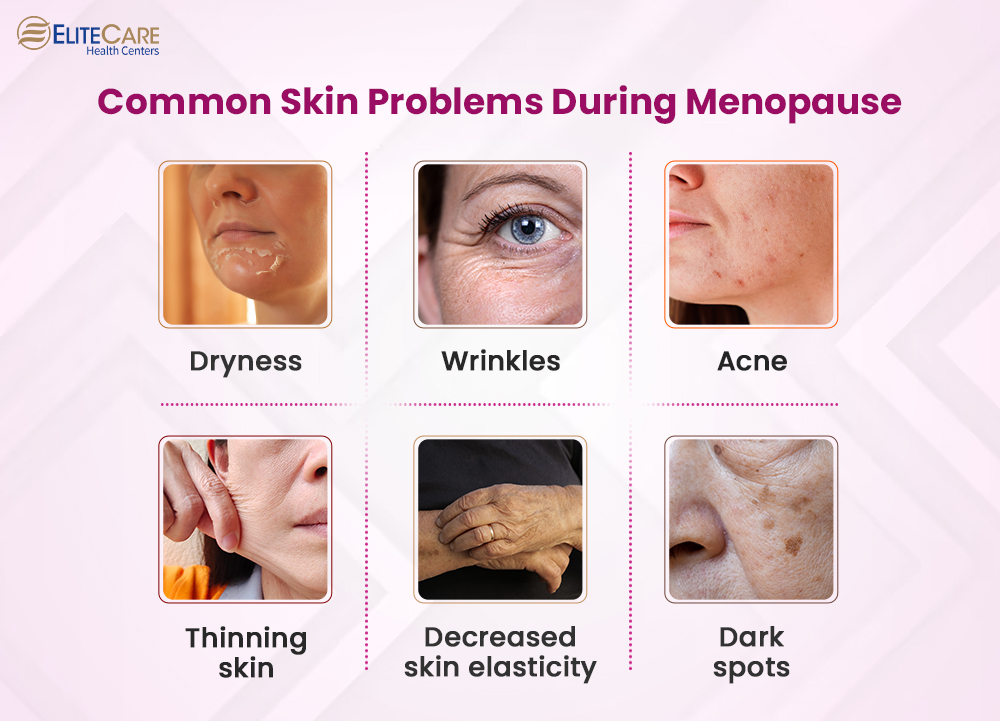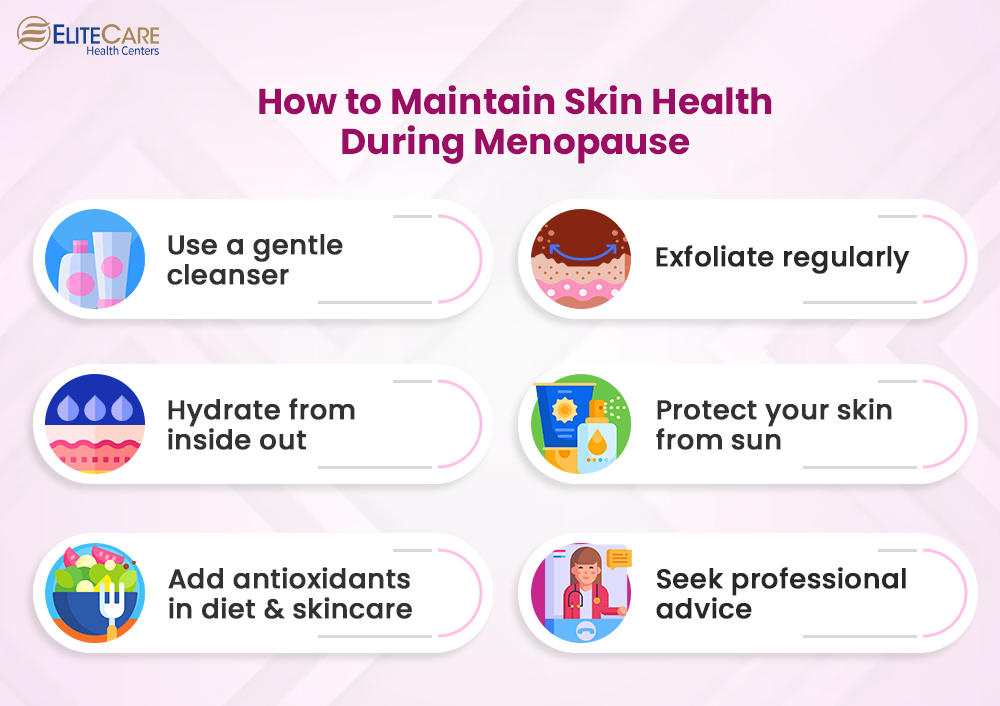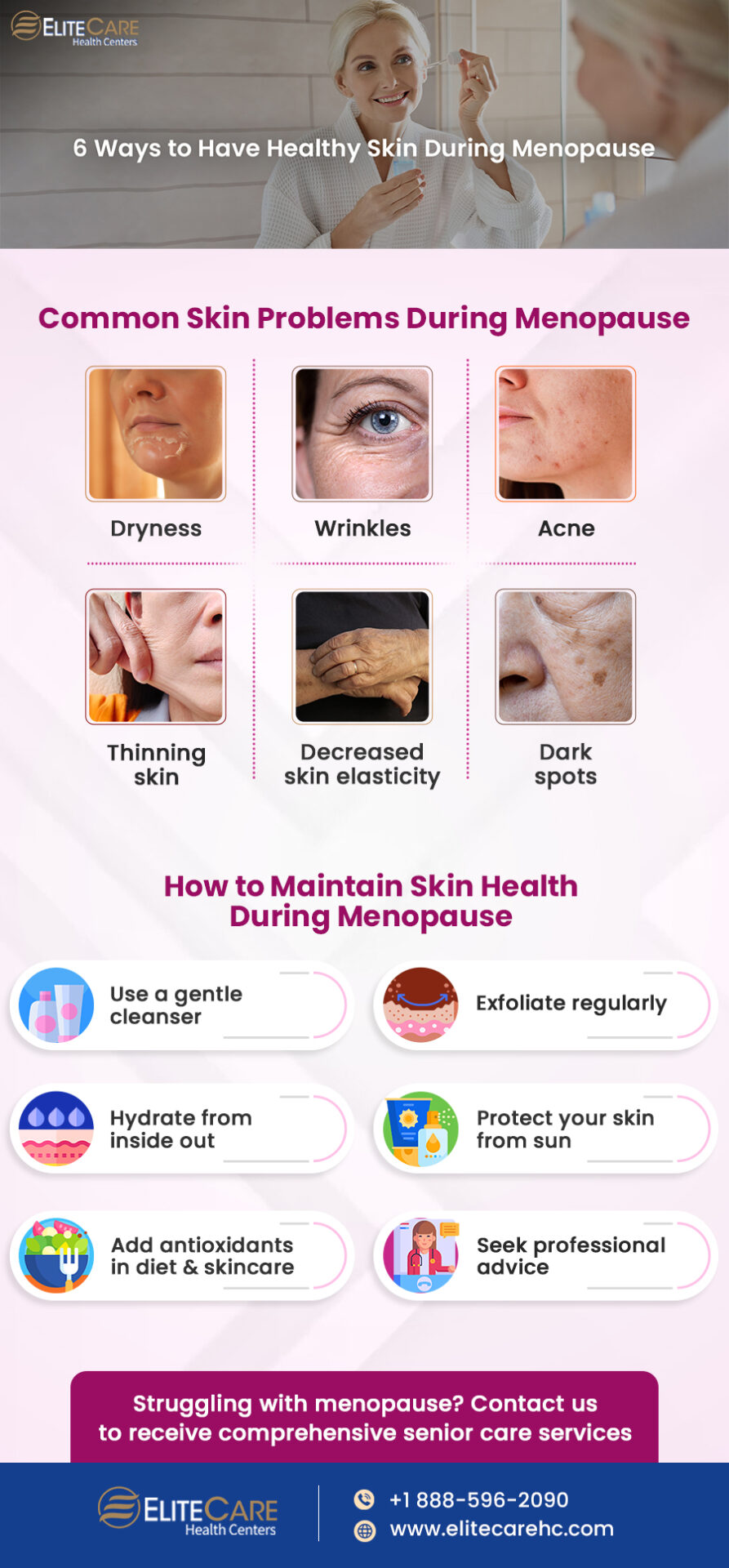
Menopause is a natural stage in a woman’s life, signifying the end of her reproductive years. This transition brings various physical and emotional changes, mainly due to hormone fluctuations. One area that is often impacted by menopause is the skin.
In this blog post, we will delve into the secrets of healthy skin during menopause. We will share insights into the specific challenges menopausal women face and discuss practical skin care tips to maintain healthy skin. Read on to learn more.
Understanding Menopause and Its Effects on Skin
Menopause is a natural biological process that typically occurs in women between 45 and 55. It signifies the end of reproductive years, as the ovaries stop producing eggs, and the hormone levels, particularly estrogen and progesterone, decline significantly.
During menopause, the skin undergoes several changes due to hormonal fluctuations. Estrogen hormone helps maintain skin elasticity, moisture, and thickness. As estrogen levels decline during menopause, the skin becomes thinner, drier, and more prone to wrinkles and sagging.
Additionally, collagen and elastin- two components responsible for the skin firmness and elasticity, also decrease during this time.
Common Skin Problems During Menopause

Dryness
As estrogen levels decrease, it can disrupt the skin’s natural moisture barrier, eventually leading to reduced hydration. Dry skin can also cause itching, flaking, and a feeling of tightness in the skin.
Wrinkles and fine lines
During menopause, collagen and elastin production declines, making the skin more susceptible to wrinkles and fine lines. Women often experience these changes around the eyes, mouth, and neck.
Thinning skin
Since estrogen levels drop significantly during menopause, it makes the skin thinner and more fragile. It can increase skin sensitivity and make women more susceptible to bruising or tearing.
Age spots
Hormonal changes during menopause can increase the risk of pigmentation, which may eventually form dark patches on the skin. Menopausal women often report this type of hyperpigmentation on their face, hands, and chest.
Acne or breakouts
Although not common, some women may experience an onset of acne or breakouts during menopause. Fluctuating hormone levels can disrupt the balance of oil production in the skin, leading to clogged pores and inflammation.
Decreased skin elasticity
Reduced production of collagen and elastin fibers causes the skin to lose its elasticity, resulting in sagging and a loss of firmness. It is particularly evident in areas such as the jawline and neck.
Not all women going through menopause experience the same skin changes during menopause. The severity and specific skin problems can vary depending on genetics, lifestyle, and overall health. However, understanding these common issues can help women proactively address their skincare needs during this phase of life.
Strategies to Maintain Skin Health During Menopause

1. Cleanse gently
As hormone levels change, the skin may become more susceptible to dryness, sensitivity, and decreased natural oil production. Proper cleansing helps to remove impurities, excess oil, and environmental pollutants.
Use a mild, non-drying, fragrance-free cleanser specifically formulated for mature or menopausal skin. Look for products free from harsh ingredients such as sulfates and alcohol, which can strip the skin of its natural oils and disrupt the moisture barrier. Cream or foam cleansers are often more gentle and moisturizing for menopausal skin.
Individuals should cleanse their faces in the morning and evening to remove impurities and prepare their skin for subsequent skincare products. While cleansing, use lukewarm water instead of hot water to avoid further skin irritation. After cleansing, gently pat dry with a soft towel and avoid rubbing.
It is wise to contact a senior care service provider and consult a primary care physician, dermatologist, or skincare professional to get the right cleanser for menopausal skin.
2. Hydrate from the inside out
As hormone levels decline, the skin’s natural moisture barrier can be compromised, often leading to dryness, flakiness, and a dull complexion. Proper hydration helps maintain the skin elasticity, suppleness, and overall health.
To ensure hydration, drink adequate water and increase water intake on hot and humid days. Incorporate fruits and vegetables like watermelon, cucumber, oranges, and leafy greens, which have high water content. Also, limit caffeine and alcohol intake as they can dehydrate the body, further contributing to dry skin.
Additionally, individuals should frequently use a moisturizer specifically formulated for mature skin to ensure external hydration. Look for ingredients like hyaluronic acid, glycerin, and ceramides, which help to replenish moisture and strengthen the skin barrier. Cleanse first and then apply moisturizer to damp skin to lock in hydration.
Individuals should adjust their hydration needs based on a few factors, including physical activity levels, climate, and individual body requirements.
3. Incorporate antioxidants
During menopause, hormonal changes can increase oxidative stress, eventually leading to premature aging, inflammation, and damage to the skin cells. Antioxidants can help neutralize free radicals and support collagen production, minimizing the signs of aging.
Fruits and vegetables are excellent sources of antioxidants. Include berries, citrus fruits, leafy greens, tomatoes, and bell peppers in your diet. Consume carrots, sweet potatoes, oranges, broccoli, almonds, sunflower seeds, green tea, etc., which are rich in vitamins A, C, and E. Consult a certified primary care physician or a registered dietitian before making any significant changes to diet.
While selecting skincare products, choose those that contain antioxidants like vitamins C, E, and A or plant-based antioxidants such as green tea extract, resveratrol, or coenzyme Q10. These ingredients can help protect skin from environmental damage and promote a youthful appearance.
4. Exfoliate regularly
During menopause, the natural exfoliation process of the skin may slow down, leading to a buildup of dead skin cells on the surface. It can lead to dullness, clogged pores, and a lack of radiance. Regular exfoliation helps remove these dead skin cells, revealing a smoother, brighter complexion and promoting better absorption of skincare products.
For menopausal skin, dermatologists generally recommend gentle chemical exfoliators, such as alpha-hydroxy acids (AHAs) like glycolic acid or lactic acid, or beta-hydroxy acids (BHAs) like salicylic acid. Individuals can begin exfoliating once or twice a week and monitor how their skin responds. If they experience skin irritation or excessive dryness, they can reduce the frequency or switch to a milder exfoliating product.
Women with certain skin conditions, including rosacea, eczema, or active acne, should contact a medical clinic and consult a dermatologist before incorporating exfoliation into their skincare routine.
5. Protect your skin from the sun
The harmful UV rays can accelerate skin aging and damage collagen and elastin fibers. The following steps can ensure effective sun protection:
- Choose a broad-spectrum sunscreen with SPF 30 or higher and apply it regularly regardless of the weather. Apply it generously to all exposed skin, including the face, neck, and hands, and remember to reapply every two hours, especially during outdoor activities.
- Avoid going out, especially during peak hours when the sun’s rays are the strongest (typically between 10 a.m. and 4 p.m.).
- Wear lightweight, loose-fitting garments that cover your arms, legs, and neck. Additionally, consider wearing a wide-brimmed hat and sunglasses with UV protection to shield your face and eyes.
- Look for moisturizers, foundations, and lip balms that contain SPF. These products provide an extra layer of sun protection during routine skin care.
6. Seek professional advice
Consider consulting a primary care physician, dermatologist or skincare specialist who can provide personalized recommendations and treatments based on individual skin concerns. They may suggest procedures such as laser therapy, chemical peels, hormone replacement therapy, or dermal fillers to address specific skin issues.
Every individual’s skin is unique, and it may take some trial and error to find the right skincare routine.
The Bottom Line
Menopause is inevitable, and its side effects may vary for every woman. The impact of menopause on the skin is not entirely preventable, but it can be managed with healthy lifestyle practices and a consistent skincare routine. Therefore, individuals should consult a primary care physician or a dermatologist to determine the most suitable treatment options for their specific concerns.
For any queries or concerns about skin health, contact EliteCare Health Centers, a healthcare center in Florida, and schedule an appointment with a board-certified primary care physician. We are a medical clinic that specializes in a wide range of primary care and senior care services including preventive care, routine physical exams, annual checkups, venipuncture, and more!






